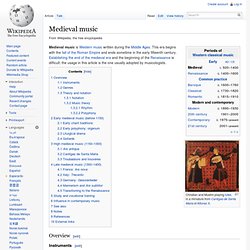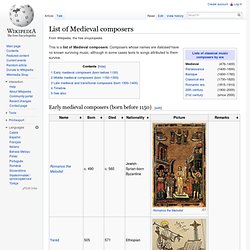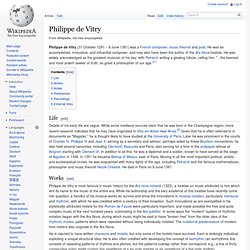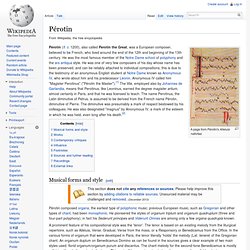

Medieval music. Medieval music is Western music written during the Middle Ages.

This era begins with the fall of the Roman Empire and ends sometime in the early fifteenth century. Establishing the end of the medieval era and the beginning of the Renaissance is difficult; the usage in this article is the one usually adopted by musicologists. Overview[edit] Instruments[edit] Genres[edit] Medieval music was both sacred and secular.[2] During the earlier medieval period, the liturgical genre, predominantly Gregorian chant, was monophonic.[3] Polyphonic genres began to develop during the high medieval era, becoming prevalent by the later 13th and early 14th century.
Of greater sophistication was the motet, which developed from the clausula genre of medieval plainchant and would become the most popular form of medieval polyphony.[6] While early motets were liturgical or sacred, by the end of the thirteenth century the genre had expanded to include secular topics, such as courtly love. Theory and notation[edit] List of Medieval composers. This is a list of Medieval composers.

Composers whose names are italicised have no known surviving music, although in some cases texts to songs attributed to them survive. Early medieval composers (born before 1150)[edit] Middle medieval composers (born 1150–1300)[edit] Late medieval and transitional composers (born 1300–1400)[edit] Timeline[edit] See also[edit] Guillaume de Machaut. Machaut (at right) receiving Nature and three of her children. From an illuminated Parisian manuscript of the 1350s (sometimes spelled ) (c. 1300 – April 1377) was a Medieval French poet and composer . He is one of the earliest composers on whom significant biographical information is available.
According to Daniel Leech-Wilkinson , Machaut was "the last great poet who was also a composer". Well into the 15th century, Machaut's poetry was greatly admired and imitated by other poets, including Geoffrey Chaucer . Machaut composed in a wide range of styles and forms. Guillaume de Machaut was born c. 1300 and educated in the region around Rheims .
He was employed as secretary to John I , Count of Luxemburg and King of Bohemia , from 1323 to 1346 and also became a canon (1337). Machaut survived the Black Death that devastated Europe and spent his later years living in Rheims composing and supervising the creation of his complete-works manuscripts. Guillaume de Machaut: Douce dame jolie. Philippe de Vitry. Philippe de Vitry (31 October 1291 – 9 June 1361) was a French composer, music theorist and poet.

He was an accomplished, innovative, and influential composer, and may also have been the author of the Ars Nova treatise. He was widely acknowledged as the greatest musician of his day, with Petrarch writing a glowing tribute, calling him: "...the keenest and most ardent seeker of truth, so great a philosopher of our age. "[1] Life[edit] Details of his early life are vague. Works[edit] Philippe de Vitry is most famous in music history for the Ars nova notandi (1322), a treatise on music attributed to him which lent its name to the music of the entire era. Philippe de Vitry: Colla iugo subdere / Bona condit cetera / Libera me, Domine. Pérotin. A page from Pérotin's Alleluia nativitas Musical forms and style[edit] Pérotin composed organa, the earliest type of polyphonic music; previous European music, such as Gregorian and other types of chant, had been monophonic.

He pioneered the styles of organum triplum and organum quadruplum (three and four-part polyphony); in fact his Sederunt principes and Viderunt Omnes are among only a few organa quadrupla known. A prominent feature of his compositional style was the 'tenor'. The tenor is based on an existing melody from the liturgical repertoire, such as Alleluia, Verse; Gradual, Verse from the mass, or a Responsory or Benedicamus from the Office. Organa exist for two to four voices. There is another group of new compositions on new texts, the conductus, which exist in a variety of forms: monophonic strophic songs and simple or complex conductus for two to four voices. Works[edit] Contemporary critiques[edit] Influence[edit]
Pérotin: Viderunt omnes [with score - original manuscript]